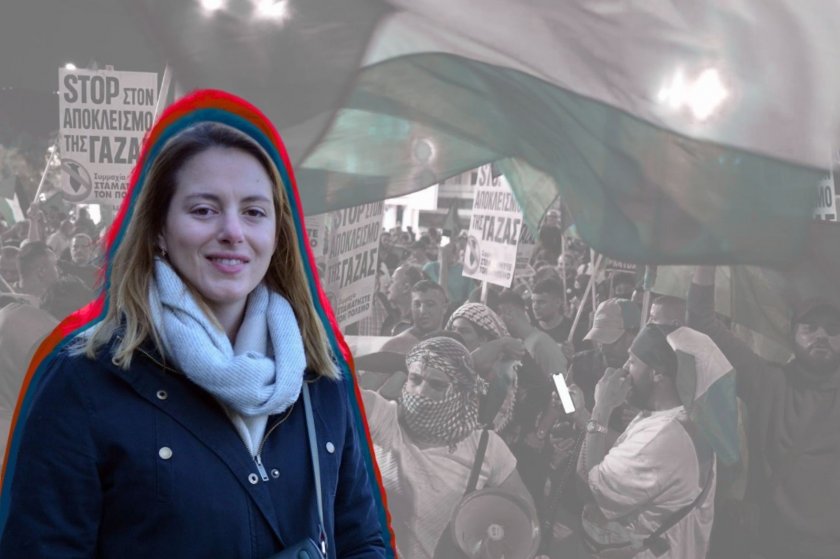“It would be much easier now for Trump to establish an anti-democratic system of government”
Isabel V. Hull from Cornell University: “The upshot of this is that democracy has already been severely undermined and it would be much easier now for Trump in a second term, to establish an anti-democratic system of government.”

Fotoğraf: AA
Ekim KILIÇ
New York
The Ralph Bunche Institute, DAAD Alumni Association of the USA and the German Consulate in cooperation with the Germany on Campus program organized by the Ralph Bunsche Institute, European Union Studies and the German Consulate organized sessions comparing various aspects of the United States of 2024 with the Weimar Republic of 1919-1933. In the first of the sessions we attended, Prof. Isabel V. Hull from the Department of History at Cornell University gave a presentation on the military and paramilitary groups. After the event, we conducted an interview with Prof. Hull via e-mail.

You divided your presentation into three parts. Please correct me if I am wrong. The first was on political violence, the military and paramilitary forces, the second on coup attempts and the third on the dissimilarities between two countries. In this framework, you talked about the parallels between the USA in 2024 and the Weimar Republic in 1919-1933. What are these? And why is this comparison necessary and important?
I was assigned to speak on the “military,” which suggested looking at political violence and its relation to paramiliraty groups vs the regular army, and to coup attempts. The comparison to both things between the US and Weimar does not have enough similarities to be meaningful. But a third aspect does: Gleichschaltung, i.e., the consolidation of dictatorship. My argument was that both in the Weimar Republic and the US the undermining of democracy has been going on a long time, it is partly institutional (courts, parties), and partly due to stove-piped media and public opinion. Both processes were/are longterm.
Could you elaborate on the concept of Gleichschaltung in the context of the US? Is there any historical tendency to reflect such a consolidation? If yes, could you exemplify it?
Gleichschaltung (coordination) was the period from Hitler’s appointment as chancellor on 30 Jan. 1933 to his amalgamation of chancellor/president on 2 Aug. 1934 and the army’s oath of allegiance to him personally. It combined legal-seeming methods (like the Reichstag Fire Decree and the Enabling Act) with political violence. The laws/decrees outlawed the Communist Party, ended civil rights and political freedoms for everybody and consolidated power in the chancellor instead of the democratically-elected Reichstag. Thus, these “laws” effectively ended democracy. The political violence began immediately, reaching perhaps 500-600 dead by October 1933. The next wave of violence was the execution of Ernst Röhm, head of the SA--the Nazis’ paramilitary group--which the army felt threatened its own monopoly over violence. Perhaps 100 people were murdered in this same episode (June 1934), and the most remarkable part was the President Hindenburg and army leaders accepted the murders.
There are two important points about Gleichschaltung: 1) it combines legal-seeming measures with political violence; and 2) it had been going on for a long time, before Hitler became chancellor, via undermining of the Republic by “respectable” political parties, the courts, some in the officer corps, the purging of the pro-republican Prussian police in July 1932, economic policies of the Brüning government designed to end reparations, but which intentionally made the depression worse, thus undercutting support for the Republic, etc. Once Hitler was chancellor of a coalition government, his coalition partners greased the consolidation of power and dissolved their own parties “voluntarily.”
The comparison with the U.S. is the gradual extension of presidential power into what’s called “the imperial presidency”, the stasis in Congress and its abdication of oversight over laws, the packing of the Supreme Court and appellate courts in the first Trump administration, the collapse of an independent Republican party, the undermining of the one person-one vote principle via gerrymandering and other discriminatory fiddling at the state level by Republicans, the unwillingness of billionaire newsowners (LA Times, Washington Post) to endorse anyone for President, the slowness in the established media in recognizing that Trump and his supporters represent a new, dangerous, and different phenomenon from anything on the so-called “left.” etc. The upshot of this is that democracy has already been severely undermined and it would be much easier now for Trump in a second term, to establish an anti-democratic system of government.
And what are the differences besides these parallels?
Differences: the ratio of paramilitary to regular military is reversed in Weimar and the US. During Weimar’s coup attempts (1919/1920), the regular army enlisted the right-wing paramilitaries to put down left-wing attempts. In 1920, the army split on stopping right-wing attempts, but in 1923, it stayed loyal in putting down Hitler’s attempt, which is why Hitler switched to legal-seeming measures.
I would like to ask a theoretical question. During your presentation you've said “valid historical comparisons are based on function,” and later mentioned “comparing dissimilarities make us focus on interesting questions” - Could you elaborate on these points regarding how meaningful they are in the context of comparison between the USA today and Weimar Republic?
I said valid comparisons in historical examples depend on a multitude of similarities with just some differences, which is why the “military” angle won’t work well.
What do you think January 6th was? The reports that came in say it was planned before. But from the outside it looks like an attempt by frivolous fascist gangsters even if it was planned. For example, does January 6th have a counterpart in the army? Or I can ask this question in general, do you think there are political cliques in the US military? What makes them serious like Hitler's party?
January 6th was an insurrection which used a riot as cover. It was planned by Trump and by the folks at the Willard Hotel. It was not put down promptly enough for reasons we don’t fully understand, but which have to do with “Acting” officials in the Department of Defense and the Army--I’d have gone into greater detail here, but nobody asked the question. There are some political cliques in the army (vid. Michael Flynn and possibly his brother, Charles), but on the whole, the army stays very correctly out of politics. That might have been one reason it hesitated to intervene on Jan. 6th. But, as I said, there are other possibilities, too, and they’ve never been adequately uncovered.
What are those possibilities? And as a second part of my question, does it have to do anything with “Acting” official in the Department of Defense?
As to Jan. 6th: It’s important to reiterate here two points: 1) the U.S. army has always stayed out of politics; and 2) we don’t have the complete story on what happened on Jan. 6th, either at the Willard Hotel, or about the delayed response by the National Guard. The plethora of officials with only “acting” titles, means that Trump appointees were in charge of decision making in the Dept. of Defense and Dept. of the Army, which might indeed have made a difference, either from political conviction, or lack of experience and knowledge.
What are the parallels and differences between the base of German Aryan racist nationalism and the base of Trumpist nationalism? Where does Trump's growing support among Latinos and blacks put him?
Trump is the cover for white-supremacist and “Christian-nationalist” groups, which seek to use him for their own purposes. In addition, there are reactionaries at the Heritage Foundation and the America First Policy group, who have goals of their own (economic, foreign policy, social). One could find many parallels here to Weimar, insofar as the NSDAP was an amalgam of different right-wing groups with different foci, and insofar as reactionaries in other parties helped to pave his way. The gender aspect in the US is extremely important (much less so in Germany), and broadly accounts for Black male support. I haven’t seen good data on Latinos and gender, so I don’t know if it’s primarily Latino men who support Trump, or not. Trump himself is a visceral, but not programmatic racist, and basically doesn’t believe in anything strongly. He’s also phenomenally ignorant. Hitler was a programmatic racist, a thorough-going ideologue, with a clear vision of what he wanted to achieve. He was not out for personal gain.
Could you elaborate on the gender side of this movement? How does it play out beyond their discourse? How central is it?
The gender aspect in the U.S. is central, because Kamala Harris is a woman, and many people who would ordinarily be voting Democratic, or who are unhappy with Trump, are at the very least hesitating because of misogyny: they think women are less competent than men, they associate “leadership” with males, they resent what they think is a loss of status for males because of greater opportunities for women, etc. Again, it will be very difficult to figure out how much of the final tally is due to gender, but in a close election, it is liable to be decisive. Trump and his movement (vide “Proud Boys”) have made misogyny central to their movement, and to the ticket (J.D. Vance). I don’t think I need add much here.
Forwarding to the next article...
10 seconds remaining





Follow Evrensel